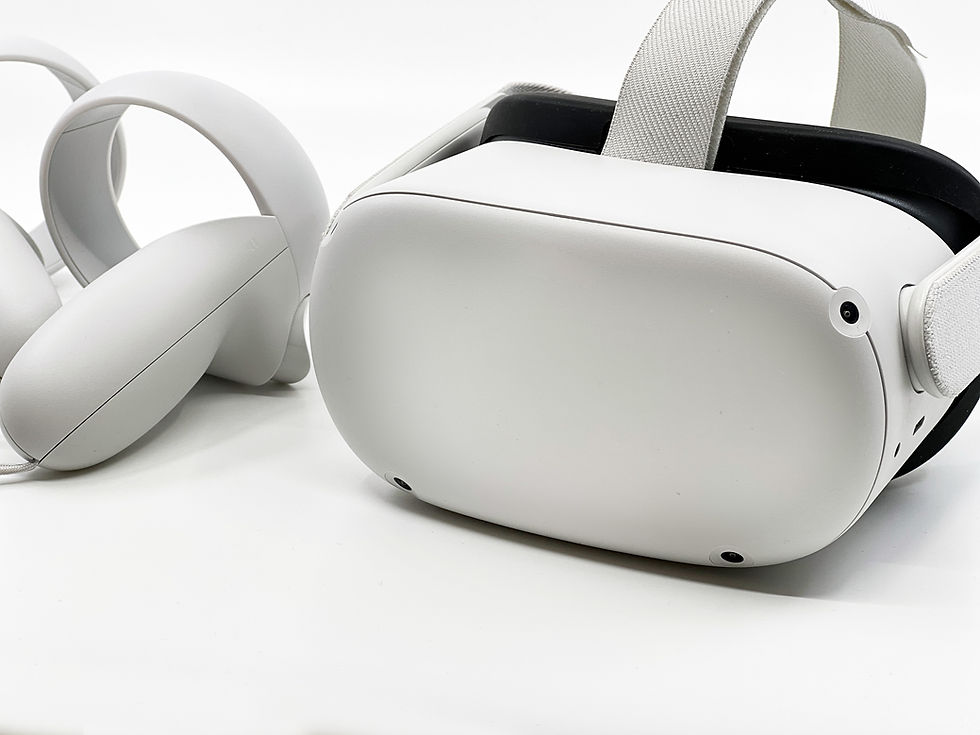Virtual Reality Simulations for Soft Skills
- Mark Cullens
- Jan 16, 2024
- 3 min read
Updated: Feb 2, 2024
Virtual Reality (VR) has emerged as a transformative tool for developing soft skills in the workplace. Its immersive nature offers a unique approach to learning and practicing skills that are crucial in today's professional environments. Here's an overview of how VR is being used for soft skills development, along with some key benefits and examples.

How VR Enhances Soft Skills Training
Immersive Learning Experiences: VR technology provides a realistic, interactive environment where employees can practice soft skills in simulated real-world scenarios. This allows them to learn by doing, which can be more effective than traditional training methods. The virtual environment offers a safe space for employees to practice, fail, and learn without the risks associated with real-life mistakes.
Customized and Adaptive Learning: Training modules in VR can be tailored to individual needs, allowing employees to learn at their own pace and style. This personalization aspect of VR training helps in addressing specific skill gaps effectively.
Enhanced Engagement and Retention: The novelty and interactivity of VR training capture employees' attention, making the learning process more engaging and memorable. This leads to better retention of skills and behaviors learned during the training sessions.
Developing Interpersonal Skills: VR simulations are particularly effective for training in interpersonal skills like communication, empathy, conflict resolution, and teamwork. Employees can experience a wide range of scenarios that help them develop these skills in a controlled and risk-free environment.
Problem-Solving Skills: VR allows individuals to engage in complex scenarios where they can practice problem-solving skills. This hands-on approach is more impactful than passive learning methods like lectures or videos.
Feedback and Improvement: VR training platforms can provide instant feedback, helping employees quickly identify areas for improvement. Some platforms even allow learners to review their performances post-session, including their facial expressions and behavioral cues, enhancing the learning process further.
Examples and Use Cases
Communication Training: Simulated customer service interactions in VR help employees practice and enhance their communication skills.
Empathy Training: Role-playing exercises in VR allow employees to understand and respond to diverse perspectives, fostering empathy.
Leadership Skills: Virtual management simulations enable practicing leadership and decision-making skills.
Teamwork and Collaboration: VR can facilitate team-building exercises and collaborative problem-solving scenarios.
Cost-Effectiveness and Scalability
While the initial costs of developing bespoke VR experiences can be high, the return on investment becomes favorable over time. VR training is generally faster and more efficient than traditional methods, leading to cost savings in the long run. The technology also offers scalability, making it suitable for large workforce training without geographical limitations.
The Future of VR in Soft Skills Training
The integration of VR into soft skills training is gaining momentum, with many organizations recognizing its benefits. It is expected that as VR technology continues to advance and become more accessible, its application in professional development and training will expand further, offering an innovative and effective solution for soft skills development in various industries.
Related Websites
Virti Insights: The Benefits of Improving Soft Skills Using Virtual Reality - Virti Insights
Deloitte Insights: The benefits of AR and VR for soft skill training - Deloitte Insights
TechTarget: How virtual reality can benefit soft skills training - TechTarget
PwC: How virtual reality is redefining soft skills training - PwC
ATD: Is VR the Solution for Soft Skills Training? - ATD
VirtualSpeech: Benefits of VR for Soft Skills Training, with Examples – VirtualSpeech
These sources provide detailed insights into how VR is transforming soft skills training, offering examples, benefits, and considerations for implementation in various settings.
Author Bio:
Mark Cullens is the founder of Digital Energy Group Ltd and brings 30 years of experience in skills and learning development. Working with VR headsets in the real world of Universities, Local Authorities and Colleges gives him a practical insight into the unique benefits of VR and challenges of using VR for soft skills development. Working closely with Bodyswaps he he provides pre-configured devices with onsite training and support.




Comments